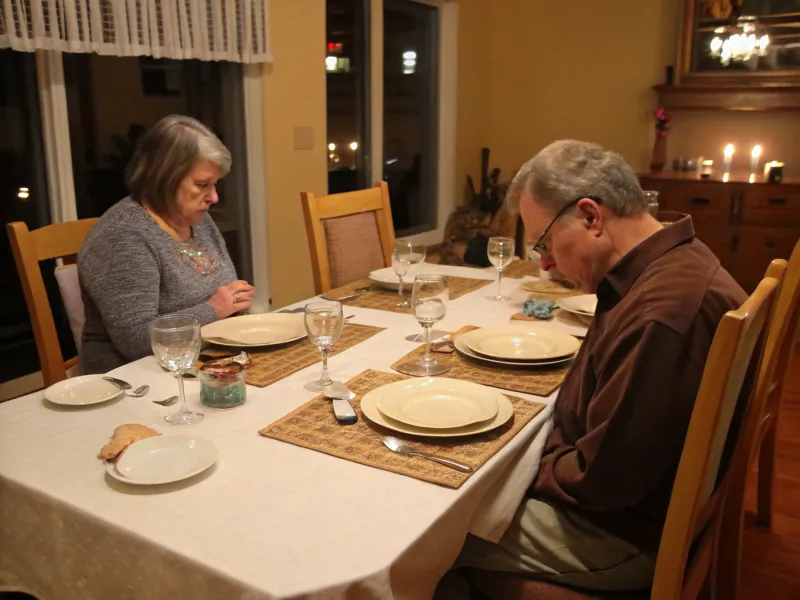27 Ways You Might Be Hurting Your Parents Without Even Knowing It

Oh, the tangled web of family dynamics! It’s a truth universally acknowledged that, sometimes, we might be unknowingly pushing our parents’ buttons and, dare I say, hurting them. But worry not, dear reader, because you and I are about to embark on a journey of self-awareness. This might be a little uncomfortable, like wearing a new pair of shoes for the first time, but it’s oh-so-necessary. After all, our parents are the pillars who stood by us when we were but wobbly toddlers, and they deserve nothing less than our love and respect.
In this blog post, we will dive into the myriad ways we might be inadvertently causing our parents distress. From the words we utter, or sometimes don’t, to the actions we take—or fail to take—each point will shine a light on how we can be kinder, more considerate offspring. So grab a cup of tea or coffee, get cozy, and let’s explore these 27 ways that can help us do better by our dear old folks.
1. Overlooking Their Texts

We live in a world where our phones buzz more than a beehive, and it’s easy to overlook a text or two. But when it’s your parents’ messages that go unanswered, it can sting a little more than you’d expect. Imagine waiting for a reply to a heartfelt message, only to be met with silence—ouch!
The truth is, our parents’ texts often carry more weight than we realize. They’re not just shooting the breeze; they genuinely want to connect with us. Ignoring their messages might feel like a small thing to us in the hustle and bustle of daily life, but it can make them feel neglected or unimportant.
So, here’s the scoop! Next time that familiar ‘ping’ goes off, take a moment to respond. A quick ‘Hi, I’ll call you later!’ can mean the world to them. It’s a simple gesture that reassures them that they’re still a priority in your life and not just another notification to be swiped away.
2. Missing Family Dinners

Ah, the family dinner—a ritual as old as time itself! But let’s face it, sometimes life gets in the way, and that cozy scene around the dinner table becomes a distant memory. However, skipping family meals might send a message that you didn’t intend to convey.
Parents often cherish these shared moments as an opportunity to catch up and enjoy each other’s company. When you consistently miss these gatherings, it can make them feel that their efforts in creating a loving environment are unappreciated. It’s not just about the food; it’s about the bond.
So what’s the takeaway? Try to make an effort to be there. Even if it’s just once a week, that time spent together can rekindle the warmth in your relationship. It’s about creating memories and showing them that you value the time spent together, reinforcing the special place they hold in your heart.
3. Forgetting Important Dates

We all have calendars and digital reminders, yet somehow, those important dates slip through the cracks. Missing a birthday, anniversary, or any significant event can feel like a personal slight to our loved ones.
Now, don’t get me wrong, everyone forgets things from time to time, but consistently forgetting these special days can make your parents feel like they’re not at the forefront of your mind. It’s not about grand gestures; sometimes, a simple phone call or a heartfelt card can make all the difference.
What’s the fix? Perhaps set a reminder on your phone or mark it on a calendar prominently placed. These small acts ensure you don’t miss the chance to show your parents they matter. Trust me, the smile on their faces will be worth the effort, and you’ll feel good knowing you’ve made their day a little brighter.
4. Not Listening to Their Stories

There’s something timeless about the stories our parents tell. Whether it’s a cherished memory or an oft-repeated tale, it holds a piece of their heart. Yet, sometimes, in our busy lives, we might tune out, nodding absentmindedly while scrolling through our phones.
But here’s the thing: when we dismiss their stories, we’re overlooking the essence of who they are. These narratives are a window into their past, their values, their dreams. Ignoring them can make our parents feel like their history and experiences are irrelevant.
Here’s a suggestion: the next time they start recounting that story you’ve heard a million times, listen actively. Ask questions, engage with their memories. You might just learn something new, and more importantly, you’ll show them they’re cherished and valued. It’s a small way to give back the unconditional love they’ve shown us.
5. Criticizing Their Choices

We all have opinions, and sometimes, we feel compelled to share them, especially when it comes to our parents’ choices. Whether it’s about their lifestyle, fashion, or technology use, our unsolicited advice might come off as criticism.
Now, let’s be honest, nobody likes being criticized, especially by their own children. It can feel undermining and disrespectful, diminishing the years of wisdom they’ve accumulated. Remember, they’ve navigated life’s ups and downs long before you came along.
Instead, try offering support or understanding rather than judgement. Express curiosity rather than criticism. Engage them in conversations that respect their autonomy and wisdom. It’s about mutual respect and recognizing that while you might not always agree, you can still honor their choices. It’s all about fostering an environment of love and respect.
6. Taking Their Efforts for Granted

Parents are often the unsung heroes of our lives. They do countless things for us, big and small, without expecting anything in return. But sometimes, we might start taking these efforts as given, failing to acknowledge the love and labor behind them.
Imagine working tirelessly, only for your efforts to go unnoticed. It’s not a great feeling, is it? When we overlook their contributions, it can make them feel unappreciated and invisible.
So, what can we do about it? A little recognition goes a long way. Say thank you, show appreciation, and lend a hand when you can. These gestures affirm their importance and reinforce that their efforts are seen and valued. It’s a simple way to give back a fraction of the love they’ve poured into us.
7. Assuming They Know How Much You Care

Ah, the classic assumption that our parents just know how we feel about them! While it’s comforting to believe they know we’re grateful and love them dearly, sometimes it’s not enough to leave things unsaid.
Our parents need to hear those words of affirmation just like anyone else. Assuming they know might lead to feelings of doubt or insecurity, especially if life’s busyness often gets in the way of showing it.
So, let’s change that narrative. Make it a point to tell them how much you appreciate them. Whether it’s through words, actions, or both, these affirmations are the reassurance they need. It’s about transforming assumptions into expressions of love that leave no room for doubt.
8. Not Being Patient with Them

Patience is a virtue, and sometimes it’s one we forget to extend to our parents. The fast-paced world we live in can make us impatient when our parents struggle with technology, new ideas, or even take a little longer to do things.
However, remember that they’ve been patient with us through countless tantrums, homework struggles, and teenage angst. The least we can do is return the favor. Impatience can make them feel like they’re a burden or out of touch.
Instead, let’s slow down and offer our patience and understanding. Help them navigate this ever-changing world with kindness and empathy. It’s a reminder that love isn’t just a feeling—it’s an action, one that can make them feel respected and cherished.
9. Comparing Them to Others

Comparison is the thief of joy, or so the saying goes. Yet, sometimes, we inadvertently compare our parents to others, whether it’s about tech-savviness, lifestyle choices, or achievements.
These comparisons can feel like a critique, suggesting they’re not measuring up to some arbitrary standard. It undermines their unique qualities and the individuality that makes them who they are.
So, how about celebrating their uniqueness instead? Recognize and cherish the qualities that set them apart. Their quirks, their wisdom, their love—it’s what makes them irreplaceable. Let’s swap comparison for appreciation and remind them that, in your eyes, they’re perfect just the way they are.
10. Ignoring Their Health Concerns

Health is wealth, as they say, yet sometimes we might brush off our parents’ health concerns, thinking they’re overreacting or worrying too much.
But here’s the deal—our parents have been through enough to know their bodies and what feels off. Ignoring their concerns can make them feel unheard and undervalued, neglecting their well-being.
Instead, lend an ear and offer support. Encourage them to seek medical advice and be there for them. It’s about taking their concerns seriously and showing them that their health and happiness matter to us. Being present in these moments is a profound expression of care and respect.
11. Not Showing Gratitude

Gratitude, that simple yet powerful practice of acknowledging what others do for us. Yet, sometimes, we might forget to show it to our parents, assuming they know how much we appreciate everything.
The truth is, acknowledgment matters. Our parents aren’t mind readers, and without vocalizing our gratitude, they might feel taken for granted. It’s not just about big gestures; even a simple ‘thank you’ can brighten their day.
Let’s make a habit of expressing gratitude often. Whether it’s for a meal they prepared, advice they gave, or simply being there, letting them know you’re grateful can strengthen your bond and remind them that their efforts are appreciated.
12. Not Spending Quality Time

In today’s digital age, quality time can sometimes take a backseat to our screens. It’s easy to get lost in the digital world and forget to spend meaningful moments with our parents.
However, these moments are precious. Our parents cherish the time spent together, which helps nurture their bond with us. Ignoring this can make them feel sidelined and unimportant.
So, how about we put down our phones and engage in activities together? Be it a walk in the park, a movie night, or a simple chat, these shared experiences create lasting memories and show our parents that they’re a priority in our lives.
13. Neglecting to Ask About Their Lives

We’re often so focused on sharing our own lives that we might forget to ask our parents about theirs. This oversight can make them feel like their lives and experiences aren’t valued.
Our parents have rich inner worlds filled with stories, adventures, and insights. When we take the time to ask about their lives, it not only makes them feel valued, but it also deepens our understanding and appreciation of them.
So, let’s flip the script and show genuine interest in their lives. Ask about their day, their thoughts, their dreams. This simple shift in focus can open up new avenues of connection and reinforce their importance in our lives.
14. Underestimating Their Wisdom

In our quest for independence, we might sometimes underestimate the wisdom of our parents. We think we know it all, but their years of experience often bring valuable insights that we might overlook.
When we dismiss their advice, it can feel like we’re disregarding the life lessons they’ve gained and the guidance they wish to impart. It’s about more than just advice; it’s their way of caring and wanting the best for us.
Let’s take a moment to consider their words. Whether we agree or not, acknowledging their wisdom shows respect and appreciation for their perspective. It’s a reminder that they’ve navigated life’s twists and turns and have much to offer.
15. Not Apologizing When Wrong

We’re all human, which means we’re prone to making mistakes. But sometimes, pride gets in the way, and we might struggle to apologize to our parents when we’ve messed up.
However, apologies are powerful. They show accountability and a willingness to mend relationships. Failing to apologize can leave issues unresolved and hurt feelings lingering.
So, let’s embrace humility and own up to our mistakes. A sincere apology can go a long way in strengthening our relationship with our parents. It’s about acknowledging our imperfections and showing them that you value the relationship enough to make amends.
16. Dismissing Their Suggestions

Parents, they always have something to say! But sometimes, we might dismiss their suggestions outright, thinking we know better. However, this can make them feel unappreciated and undervalued.
Their suggestions often come from a place of love and experience. When we dismiss them, it’s as if we’re saying their input doesn’t matter, which can be hurtful.
How about we give their advice a fair chance? Listen, evaluate, and then decide. This approach not only shows respect but also recognizes their desire to contribute positively to our lives. It’s about creating a dialog rooted in mutual respect and love.
17. Avoiding Difficult Conversations

Let’s be honest, difficult conversations are, well, difficult. But avoiding them with our parents can create distance, leaving important issues unresolved.
When we shy away from these discussions, it can make our parents feel shut out and disconnected. They want to be involved and supportive, even in challenging times.
So, what’s the game plan? Approach these conversations with openness and honesty. It might be uncomfortable, but it’s a step towards deeper understanding and connection. These talks show our parents that they’re trusted confidants in our lives, reinforcing the bond we share.
18. Not Supporting Their Dreams

Our parents have dreams too, some of which they may have put on hold to support ours. So, when they share their aspirations, it’s important to be supportive and encouraging.
Ignoring or belittling their dreams can make them feel like their desires are unimportant. Remember, dreams have no expiration date, and they deserve the same encouragement they’ve given us.
So, let’s be their cheerleaders. Show interest, offer support, and celebrate their milestones. It’s a way of saying, ‘I believe in you, just as you’ve always believed in me,’ and it nurtures a reciprocal relationship of love and encouragement.
19. Not Respecting Their Boundaries

Boundaries, they’re vital in any relationship, including the one with our parents. Sometimes, in our eagerness to help or be involved, we might overstep, disregarding their personal space or decisions.
Not respecting their boundaries can make them feel disrespected and undervalued. It’s important to remember that they’re individuals with their own needs and limits.
Let’s make a conscious effort to honor their boundaries. Ask before intervening, respect their space, and support their autonomy. It’s about fostering a respectful and understanding relationship that acknowledges their individuality.
20. Taking Sides in Family Conflicts

Family conflicts, they happen to the best of us. But taking sides can make things more complicated and hurtful.
When we choose sides, it can make one parent feel isolated or unsupported. They need to know that you’re there for both of them, even when disagreements arise.
So, rather than taking sides, try to be a peacemaker. Encourage dialogue, understanding, and resolution. It’s about being supportive without getting caught in the crossfire, showing them that your love and support are unwavering for both.
21. Not Valuing Their Opinions

Ah, opinions, everyone’s got them! But sometimes, we might overlook our parents’ views, prioritizing our own beliefs.
Our parents’ opinions are shaped by years of experience and insight. Dismissing them can make them feel undervalued and unappreciated.
What can we do? Value their opinions, even if they differ from our own. Engage in discussions that respect their perspective and show them that their input is valued. This approach fosters an environment of mutual respect and strengthens your bond.
22. Interrupting Them Mid-Sentence

We’ve all been there—caught up in a conversation when suddenly, an interruption occurs. But when we interrupt our parents, it can make them feel unheard and disrespected.
Every time we cut them off, it sends a message that what they’re saying isn’t important. It’s not just rude; it can be hurtful.
Let’s practice active listening. Allow them to finish their thoughts, showing respect for their words and feelings. It’s a small change, but one that can significantly impact our relationship, showing them that they’re valued and heard.
23. Not Celebrating Their Achievements

Our parents achieve things too, from career milestones to personal accomplishments. Yet sometimes, we might overlook these achievements, focusing solely on our own.
Celebrating their successes is important—it acknowledges their efforts and shows them that we’re proud of them.
So, next time your parent shares an achievement, big or small, make it a point to celebrate with them. It’s a way of showing appreciation and pride in their accomplishments, reinforcing their importance in your life.
24. Neglecting to Check In

Life gets busy, and sometimes, we might forget to check in with our parents regularly. This can make them feel like they’re an afterthought.
Checking in is more than just a formality; it’s a way of showing care and interest in their well-being. It’s about maintaining the connection and letting them know they’re in your thoughts.
Let’s make it a habit to call or visit them regularly. Ask about their day, their feelings, their life. These small acts of reaching out can make a significant impact, strengthening your bond and showing them they’re loved.
25. Not Sharing Important News

Sharing is caring, or so they say. But sometimes, we might forget to share significant news with our parents, leaving them in the dark.
Not sharing important events in our lives can make them feel excluded and distanced from our world. They want to be part of our journey, celebrating our joys and supporting us through challenges.
So, let’s make an effort to include them in our news. Whether it’s a promotion, a new relationship, or even a small victory, sharing these moments keeps them connected to our lives and shows them that they’re valued members of our family.
26. Assuming They Won’t Understand

There’s a common fear that our parents just won’t understand the complexities of our modern lives. But assuming they won’t understand can create barriers that don’t need to be there.
Our parents have the capacity for empathy and understanding, often more than we give them credit for. By assuming they won’t understand, we rob them of the opportunity to be supportive and involved.
So, let’s break down those walls. Share your experiences, your struggles, your triumphs. You might be surprised at how much they do understand and the support they can offer. It’s about building bridges, not walls, and fostering an inclusive relationship.
27. Not Saying ‘I Love You’ Enough

Three simple words that carry so much weight—‘I love you.’ Yet, sometimes, we might not say them often enough, assuming our parents already know.
But expressing love is important. It’s not about frequency but sincerity. These words offer reassurance and comfort, reminding our parents of their cherished place in our hearts.
Let’s make it a point to say ‘I love you’ more often. Whether it’s in person, over the phone, or in a note, these words have the power to strengthen our bond and remind them of the love that’s always there.
